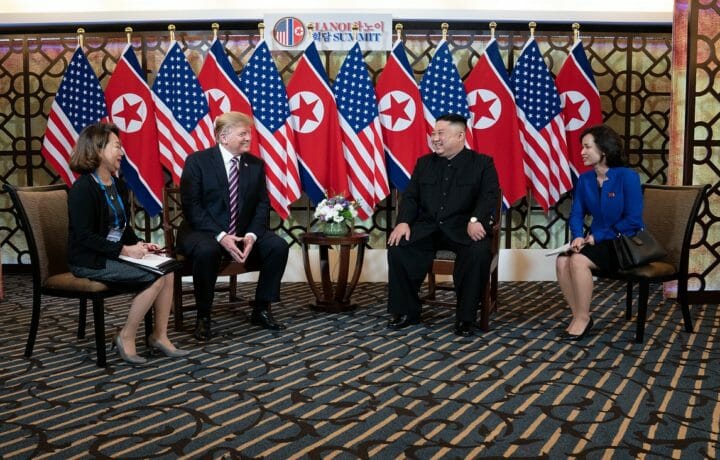As President Donald Trump prepares to meet with North Korean Chairman Kim Jong-un in Hanoi, expectations run the gamut. No one truly expects the two men to emerge with a solid roadmap to the complete, verifiable, and irreversible denuclearization of the Korean peninsula (often shortened to CVID). There are, however, plenty of other possible and productive outcomes.
Kim could promise, as some have speculated, to shutdown the Yongbyon reactor that has provided the fuel for the People’s Republic’s existing nuclear arsenal. Trump could agree to formally end the Korean War, which has been in state of suspended animation since 1953. Even coming to a solid agreement on exactly what “denuclearization” means would be a positive development.
But there’s one thing I hope above all that Trump extracts from Kim: a promise to engage in meaningful talks at the working-group level.
Love letters, but no dates
Trump and Kim clearly get along. Even without the president’s comments about falling in love, you could see that the “chemistry” was real. That counts for something, but it doesn’t get the hard work done. Presidents can rarely negotiate the finer details of the voluminous treaties that a complex issue like CVID requires. Those details are worked out by the career diplomats who specialize in the issues at hand during long meetings in hotel conference rooms.
The national-level leaders’ job is to put the final stamp of approval on the results of all that haggling over whether to call the young canine a puppy or a small dog. Since Trump and Kim met in Singapore last June, the U.S. has tried consistently, and unsuccessfully, to conduct these serious diplomatic-level discussions.
The U.S. has certainly tried to get that process moving. Secretary of State Mike Pompeo has traveled to Pyongyang twice since the summit—in early July and in October, when he met with Kim himself. (The president cancelled another planned trip in August because, he said, “we are not making sufficient progress with respect to the denuclearization of the Korean Peninsula”).
Last-minute shuffle a good sign
Through all this, the North Koreans have continued to push back against progress by calling U.S. demands “unrealistic” and its tactics “gangster-like.” But at no point has it looked like the Koreans were truly interested in doing the hard work. That may be changing, however. For the past week, the U.S. chief negotiator, Stephen Biegun, has been in Hanoi for preparatory talks.
Last August, Pompeo appointed Biegun, a man with a lifetime of experience in foreign policy in both government and business, as U.S. Special Representative for North Korea. The Koreans, however, sent a new representative to Hanoi. Kim Hyok-chol, who had previously been the DPRK’s ambassador to Spain, has taken over from Vice Foreign Minister Choe Son-hui, the highest-ranking woman in the North Korean regime.
Since the Singapore summit, I have viewed Choe as the main obstacle to a negotiated settlement. She was the one who called Vice President Mike Pence “ignorant and stupid,” and I have always suspected her of being the face behind the anonymous “gangster” comment. She played “bad cop” to Central Committee Vice Chairman Kim Yong-chol’s… well… if not “good cop,” at least “not-as-bad cop.” Her removal from the negotiating team can only be a good thing.
As they said in PyeongChang a year ago: Let the games begin.




